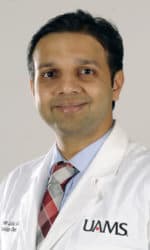Study May Bring Options for Children with Tourette Syndrome
| Barrett McAlister hopes an ongoing clinical trial at UAMS can help establish a new treatment for Tourette syndrome in children so they can focus on being kids, playing and learning, without worrying about being “different.”
“If they’ve got a chance at a normal life, I say take it,” McAlister said. “Take it with both hands.”
McAlister, 38, would know, because he has Tourette syndrome and has dealt with the distracting and sometimes embarrassing nature of his tics his whole life. That is, until he found treatment about a year ago with Mitesh Lotia, M.D., a neurologist who sees patients in the Movement Disorders Clinic at UAMS.
“I think it’s awesome,” McAlister said about the pediatric trial. “Because honestly, I dealt with it in my own way of being the first one to make the joke. If I make fun of myself, you can’t hurt me by making fun of me. But not everybody has the same personality. Some kids can kind of close themselves off. So if they have the chance to — not do that, to live a much more normal life, that’s amazing.”
Tourette syndrome is a genetic neuro-psychiatric condition that begins in childhood and is characterized by multiple repeated tics. They can be involuntary vocal sounds or brief muscular jerks. Over time, they can change in type and frequency. Tics can involve different areas of the body like the arms or legs, having a debilitating impact on daily activities.
McAlister’s tics are relatively mild and include repeated eye-blinking, facial twitches and stuttering as part of a blocking tic. However, they were limiting enough, especially in his job in sales, that people would notice.
“I got the question often enough: ‘May I ask you something personal?’ I would just say, ‘Yes, I have Tourette’s,’ because I knew that’s what it would be about,” McAlister said.
In one such exchange, however, McAlister got lucky. The customer asking him about his tics worked with Lotia. McAlister followed her advice, made an appointment, and was amazed at the advancements in treatment options for adults since the last time he sought help.
“There are a lot of options now,” Lotia said. “Sometimes we use Botox, and sometimes on more severe cases, we consider deep-brain stimulation, a surgery that helps reprogram the brain to reduce the tics.”
After trial and error with medications, Lotia and McAlister settled on Botox injections. McAlister gets them once every three to four months in his face and around his eyes to stop tics and excessive blinking, and he also gets them in the muscles in his tongue to help with his stuttering.
Now his tics are so well-managed that sometimes McAlister forgets about them.
“I recently started working with new people, and I tried to make a joke about my tics with one of my new colleagues, and they were like ‘What are you talking about?’ Usually it’s the elephant in the room and people are waiting to ask about it. I was like, ‘Wow, that’s a first,’” McAlister said.
Despite the advances for adults, treatment options for children remain limited. UAMS’ participation in the national clinical trial aims to change that. Lotia is the principal investigator on the UAMS part of a multi-center study to test an existing dopamine-depleting medication to treat another movement disorder, tardive dyskinesia, to see if it could also help with Tourette symptoms in children.
Lotia is looking for five to 10 children with moderate to severe Tourette syndrome to take part in the phase 2 study, which will involve taking the medication (or a placebo) for almost a year and tracking symptoms before, during and after.
“The tics can be a distraction for children and keep them from focusing on what they need to learn,” Lotia said. “However, if we can treat the tics along with the mood disorders, these patients otherwise don’t have other learning problems, so we can free them up so they can live their lives more fully and just get back to being kids.”
Lotia came to UAMS in 2016 after completing a fellowship on movement disorders and Tourette syndrome at Baylor College of Medicine in Houston, Texas. He is also an assistant professor in the Department of Neurology in the UAMS College of Medicine and director of the neurology residency program.
Clinical trials are one of many ways Lotia hopes to help people with Tourette syndrome. He is working to set up a Tourette support group chapter in Arkansas for education, support and resource-sharing, and he is working to establish stronger connections to national groups that do things like provide training for educators to better recognize signs of Tourette tics and help — rather than punish — children with the syndrome.
To sign up for the clinical trial or to receive more information, call 501-398-8622.
The project described is supported by the Translational Research Institute grant UL1TR000039 through the National Center for Advancing Translational Sciences of the National Institutes of Health (NIH). The content is solely the responsibility of the authors and does not necessarily represent the official views of the NIH.


